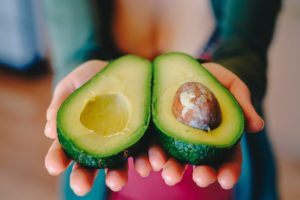
Contributor: Melissa O’Neill, LCSW, Director of Clinical Operations, Timberline Knolls
If you have ever sat down for a meal and ate to the point that you were uncomfortably full, is this something you should be concerned about? What if you find it difficult to control yourself around food, or find yourself reaching for food, even when you are not hungry? Are these behaviors indicative of Compulsive Overeating or a Food Addiction?
When it comes to overeating, compulsive overeating, or even a food addiction, there is a plethora of misinformation and confusion around these issues. Any abnormal food behaviors should never be ignored, especially if these are negatively influencing your quality of life or preventing you from your daily activities.
- What exactly is compulsive overeating?
- How does this differ from food addiction, and what can you do if you think you might be struggling?
On the surface, these conditions may appear to be similar, though there are subtle differences of which to be aware. This article will help you clear up this information.
Understanding Compulsive Overeating
Compulsive overeating can be defined by certain behaviors and criteria that may demonstrate a lack of control around food. Some of the most common and defining behaviors of compulsive overeating may include but are not limited to the following:
 Eating uncontrollably, even when not physically hungry
Eating uncontrollably, even when not physically hungry- Feeling shameful, disgusted, and/or guilty after eating
- Consuming food much more rapidly than normal
- Eating large quantities of food in a short period of time
- Eating in secrecy or alone due to feelings of embarrassment
- Chronic dieter or history of dieting
- Hiding or hoarding food
Many individuals who struggle with compulsive overeating often turn to food during moments of intense emotional experiences or in overwhelming situations. For example, after a stressful day at work, a woman may go home and binge on a large quantity of food, often as a means of solace or comfort.
Or a man who is struggling through a painful divorce might look to food as a way of distraction or a means of filling emptiness. In many situations, unresolved trauma, painful experiences, or intense emotions may be at the root of compulsive overeating.
Typically, individuals who are dealing with compulsive overeating recognize that their behaviors are abnormal and struggle to break the cycle of their eating habits. In addition, the shame that is often experienced with compulsive overeating causes those who are struggling to isolate in shame, keeping their pain and fears to themselves.
Many people with compulsive overeating tendencies may be overweight or obese, which can further contribute to the indignity that is commonly felt.
According to the National Institute of Mental Health, 2.8% of the adult population in the United States experience compulsive overeating, with the average age-of-onset occurring at about 25 years old [1].
The Basics of Food Addiction
A food addiction, by contrast, is parallel to what is experienced with a drug addiction or substance abuse. A person dealing with a food addiction experiences a chemical change in the body from eating certain foods, particularly foods that are higher in sugars, salt, and fat.
This chemical change is similar to what a drug addict might experience when abusing drugs or getting “high”. Foods that are palatable can in fact create a euphoric experience for someone who is addicted to food, and these foods can be craved and eaten, even when not necessarily hungry.
According to the Food Addiction Institute, a food addiction is a “cluster of chemical dependencies on specific foods or food in general” [1]. A person addicted to food may suffer damaging consequences as a result of their behaviors but will still find it difficult to stop from engaging in these eating patterns.
While scientific research on food addiction is somewhat limited, it has been established that various components may contribute to the development of a food addiction, including genetics, biochemical makeup, and hormonal influences.
Understanding Overlapping Behaviors
In many cases, compulsive overeating and food addictive behaviors may overlap. For example, a person who may have biological risk factors for food addiction, such as a genetic predisposition or neurochemical imbalance, could have increased susceptibility to developing compulsive eating behaviors.
Food consumption can become a way to fill an emotional void that is also perpetuated by biological influences related to the food addiction. This can create a vicious cycle that is difficult to break. For this reason, comprehensive care and treatment are absolutely crucial to address the many complex issues that are involved in both compulsive eating and food addiction behaviors.
Having an individualized treatment plan that considers all the factors involved, including biological, emotional, mental, and psychological, can help encouraging healing through whole-person care.
Seeking Out Appropriate Help and Treatment
Whether you suspect that you might be dealing with a food addiction, have the tendency to compulsively overeat, or have overlapping behaviors, it is important not to ignore these signs and symptoms.  The good news is that you do not have to have everything figured out in order to get help.
The good news is that you do not have to have everything figured out in order to get help.
Seek out a specialist in addiction or eating disorders, like a physician or counselor, to get to the root of the problem and determine what treatment approaches might be most helpful for your recovery.
Many people who are dealing with a food addiction and/or compulsive overeating feel trapped in their own behaviors, often experiencing a sense of hopelessness. Be encouraged in knowing that there is hope for a future that is not plagued by abnormal eating issues. You can begin your journey in freedom today, simply by reaching out for help.
References:
[1]: Hudson JI, Hiripi E, Pope HG, Kessler RC. The prevalence and correlates of eating disorders in the National Comorbidity Survey Replication. Biological Psychiatry. 2007; 61:348-58.
[2]: Food Addiction Institute, “What is Food Addiction”, http://foodaddictioninstitute.org/what-is-food-addiction/questions-and-answers/ Accessed 15 March 2017
About the Author:

Melissa O’Neill, LCSW, is the Director of Clinical Operations for Timberline Knolls Residential Treatment Center. Melissa’s role involves collaborating with others to create the vision and curriculum for all group programming offered at TK. She also clinically supervises the talented specialists who facilitate groups all over campus.
Early in her career, Melissa spent time in residential care, working with children with significant trauma histories. She then ran a substance abuse IOP followed by several years in private practice. She also managed an IOP/PHP program for Eating Disorders and Mood Disorders. At Timberline she started as a Primary Therapist, followed by serving as a clinical lead.
Melissa received her Bachelor of Arts degree in Psychology from Vanderbilt University. She earned her Master’s degree in Social Work from the University of Illinois. Melissa is a member of the International Association of Eating Disorder Professionals.
Thank you to Timberline Knolls for providing this article.

(Advertisement)
Timberline Knolls is a leading residential treatment center for women and adolescent girls, ages 12 and older, with eating disorders, substance abuse, trauma, mood and co-occurring disorders. Located in suburban Chicago, residents receive excellent clinical care from a highly trained professional staff on a picturesque 43-acre wooded campus. An adult partial hospitalization program (PHP) is also available in nearby Orland Park, Ill., for women to step down or direct admit. For more information on Timberline Knolls Residential Treatment Center, call 630-755-5173. We are also on Facebook – Timberline Knolls, LinkedIn – Timberline Knolls and Twitter – @TimberlineToday.
The opinions and views of our guest contributors are shared to provide a broad perspective of addictions. These are not necessarily the views of Addiction Hope, but an effort to offer a discussion of various issues by different concerned individuals.
We at Addiction Hope understand that addictions result from multiple physical, emotional, environmental, and genetic factors. If you or a loved one are suffering from an addiction, please know that there is hope for you, and seek immediate professional help.
Published on March 15, 2017
Reviewed and Updated by Jacquelyn Ekern, MS, LPC on January 12, 2021
Published on AddictionHope.com
